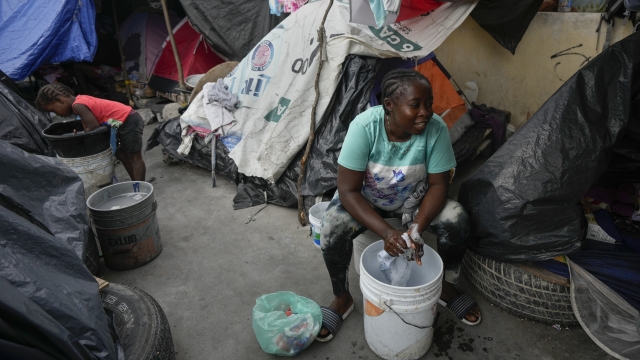As U.S. immigration policy is set to change Thursday to perhaps even harsher measures, the federal government used the Pandemic Era Public Health Order Title 42 to expel thousands of asylum seekers who crossed between ports of entry back across to Mexico. The pandemic health emergency ends at midnight Thursday.
Thousands of refugees, arriving daily, are camped out in Matamoros, Mexico, hoping for an asylum appointment to cross legally at a port of entry; or, those feeling desperate enough may plunge into the Rio Grande.
Despite the messaging from the U.S. government, people in the camp in Matamoros are willing to gamble everything in the hopes they’ll get asylum on the other side, this all before Title 42 ends.
In all likelihood, many of these people will be expelled back across the border, right back into the camp up until Title 42 expires.
When the policies change, those expelled may face further legal peril in the form of deportation and bans on reentering the United States for up to five years.
Scripps News was about a mile inland from the camp, and found a group of Haitians who are staying put. They’re not trying to cross the river, instead they’re trying to get appointments on the CBP One app. They know if they get caught crossing illegally into the U.S., their fate will be to be put back on an airplane to Port Au Prince.
SEE MORE: US, Mexico announce immigration agreement as Title 42 nears expiration
"Not just the Haitian community, I believe everyone that is in the same situation. We know that we don’t have to cross the river, do you understand? Regardless, we need to get an appointment to cross legally," said Ilfaufait Francois, a Haitian asylum seeker.
Francois is 28. He says Haitians do not want to risk being sent home, back to an island that has fallen into anarchy with kidnappings and mob lynchings.
So they’re waiting in one of the most dangerous border cities in Mexico for the privilege of declaring asylum in the U.S.
Haitian refugee Willio Budreau is trying to get an appointment through CBP One.
Humanitarian aid worker and Pentecostal Pastor Liliana Carlos says the Haitians have a tough time in Mexico.
"It's like the only group that is not risking their children or risking themselves in crossing because they know that they're going to be deported. So that's why they're here," Carlos said. "They do suffer and pay more. I mean, everybody suffers, you know, but they do suffer racism. They do suffer hunger because not everybody wants to come into a Haitian camp, you know, and just bring them food. So they struggle way more than any other group."
For Haitians, it’s baby steps towards an American dream. Francois got lucky — the CBP One app enrolled him for an asylum appointment.
"Because they are people who are feeling desperate, you know what I mean? For someone who’s been here for a while, two months, a month waiting for the appointment and their resources have been spent. Those people feel like they don’t have an option besides to cross the river illegally," Francois said.
Trending stories at Scrippsnews.com



